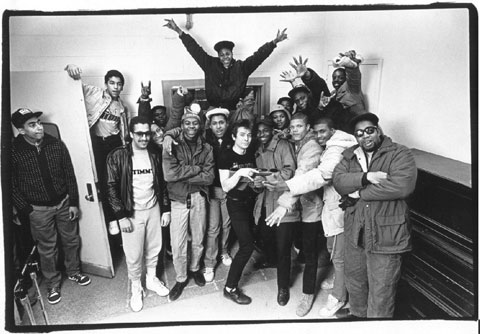
Magnus Johnstone, center, debuted Lecco’s Lemma, Boston radio’s first all-rap program at MIT’s WMBR in 1985. |
On February 22, 2013, Boston lost a legend. Magnus Johnstone was one of those people who lived up to a huge name. Known to many as the unlikely uncle of Boston hip-hop, his Lecco’s Lemma show, which began on WMBR (88.1 FM) in 1985, launched the careers of hip-hop legends such as Guru and Ed OG, as well as legions of lesser-knowns. His approach to playing records was to take all comers, and in so doing, made a home for a youth movement that had yet to recognize itself as an industry and lifestyle in the making. What is perhaps most amazing is that this incredible show was just one of many he created over the years.
Born in Chicago on July 14, 1952, Johnstone was named after his Scottish great-grandfather, spent his early years in Detroit, and arrived in Duxbury, MA as a pre-teen. He attended the School of the Museum of Fine Arts, but — never one to tread well-established paths — he left before graduation to continue his own lifelong education in art, music, literature and mysticism. He was an autodidact with an insatiable appetite for new knowledge, experience, and above all, music: it was the fuel for his drawing and painting, and he always needed more. He loved few things more than sharing his discoveries with his many devoted radio audiences.
By the time Lecco’s Lemma launched in 1985, Johnstone had already been an active member of the vibrant underground art and music scene in Boston for many years. He was deeply involved in the local artist collectives Gallery East and Punkt/Dat, and was an active community member at MIT’s college radio station, WMBR (88.1 FM). In the early 1980s, Johnstone produced a reggae show called Reggae Mukassa, an African music show called Alien’s Corner, and by 1985 was regularly filling in on an urban music show called The Ghetto. He was always seeking new sonic landscapes, and rap and electro appealed to him immediately. The enormous, positive youth response these tracks got on his guest appearances on The Ghetto convinced him to pitch the station on a show dedicated to these new sounds. The rest is local legend.
“Magnus changed everything,” Ed OG told the Phoenix’s Chris Faraone last year. “Once we were able to get on the radio, everybody in the whole neighborhood would listen. That show was the only thing going for rap — and especially for local rap.” Not only did Lecco’s Lemma provide a launching pad for artists like Guru, EdoG, The Almighty RSO, TDS Mob, and the Top Choice Clique, Johnstone was always an assiduous collector. He kept every tape every artist ever sent him. His collection, along with tapes of his broadcasts made by Boston underground-rock icon Willie “Loco” Alexander, may be the most complete record of the grassroots emergence of Boston’s hip-hop scene. (UMass Boston has reportedly agreed to archive this collection so that it can be shared with community members, fans and scholars alike.)